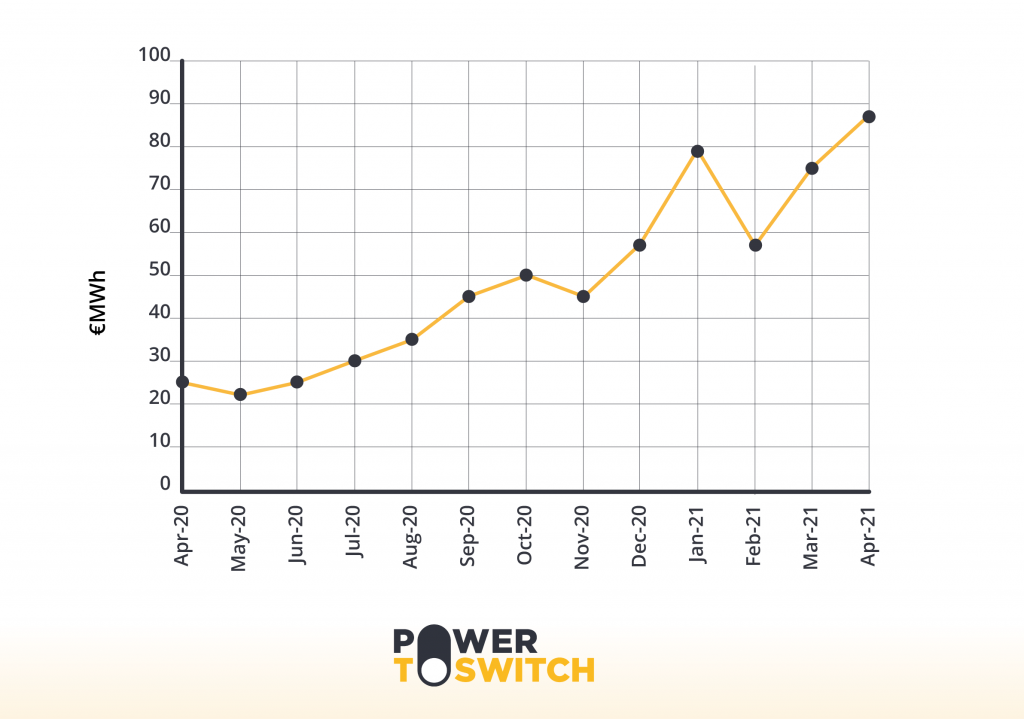Have you noticed a change to your energy bill in recent months? Chances are you’re not alone.
Unfortunately, most energy suppliers in Northern Ireland have increased prices over the last few months, or removed some of their most competitive discounts. It’s a frustrating move for many families, who have undoubtedly been feeling some level of pressure given the amount of extra home energy usage required for working and staying at home more.
So why the increase at all? Here we will break down the key issues which are pushing prices upwards and show you what you can do about it.
Which suppliers’ prices have gone up?
Many people will have noticed their energy supplier has been in touch to tell them unwanted news: that bills will increase – and it’s not a select few. In fact, the vast majority of suppliers in Northern Ireland have announced increases in their gas or electricity prices over the past few months and more price hikes could be on the way.
See the latest figures here:
| Supplier | Fuel | Tariff Rate Increase | Effective Date |
| Electric Ireland | Electricity | +3.7% | 1st Feb 2021 |
| SSE Airtricity | Electricity | +3.9% | 1st Mar 2021 |
| Budget Energy | Electricity | +3.9% | 19th Mar 2021 |
| Firmus Energy (10 towns) | Gas | +17.7% | 1st Apr 2021 |
| SSE Airtricity | Gas | +9.8% | 1st Apr 2021 |
| Firmus Energy (Gtr Belfast) | Gas | +14% | 15th Apr 2021 |
| Bright Energy | Electricity | +3.4% PaYG +9.2% Bill Pay | 26th June 2021 |
| Power NI | Electricity | +6.9% | 1st Jul 2021 |
| Budget Energy | Electricity | +14.9% | 2nd July 2021 |
| Electric Ireland | Electricity | +10.2% | 1st Aug 2021 |
| SSE Airtricity | Electricity | +9.7% | 1st Aug 2021 |
| Bright | Electricity | +(up to) 20% | 19th Aug 2021 |
| Click Energy | Electricity | +9% | 1st Sept 2021 |
What is behind these increases?
When prices are on the rise, we often hear these are driven by changes in wholesale costs – and it’s true. A large element of the bill you pay is the wholesale cost of purchasing energy by your supplier. For example, wholesale energy costs make up about 50% of your final electricity bill, so any significant change in these costs will eventually make their way through to the final amount you have to pay.
The bad news is that since late 2020, wholesale costs have increased significantly, and look like they are set to continue.
In April 2021, electricity traded on the main wholesale market was at its highest since the Single Electricity Market came into operation – up almost threefold compared to April 2020 (€85.43, Apr 21 v €27.99, Apr 20).
Basically, this huge increase is now feeding its way into bills with many suppliers, some even increasing prices twice in a matter of months.
Why do prices not go up by the same amount?
Yes, the electricity and gas supplied to your home is the same but how suppliers buy energy on the wholesale market will differ.
Some suppliers may have bought ahead (hedged) much of their energy requirements and, to some degree, may be protected from the full extent of wholesale movements. Other suppliers may have direct purchasing agreements with generators, such as wind or solar farms, which can also help reduce their exposure to wholesale movements.
This means that it is the individual purchasing strategy of the supplier which will determine how much your final bill is impacted by increasing wholesale costs.
Is there a way to avoid increases to my bill?
With global wholesale costs increasing, it may sound like the figure on your energy bill is truly out of your hands. This is only partially true, however, as there are still many ways in which you might cut back on costs and energy usage in order to offset these unpleasant price hikes.
Here are our best tips:
- Get on the best tariff: Check what tariff you are on with your current supplier. If you are on standard rate this is usually their most expensive. Many suppliers will offer a discount tariff rate (usually for the first year). It is possible to find tariffs with discounts of up to 20%, which can help offset price increases. From time to time suppliers may also offer ‘Fixed Price’ tariffs which will guarantee your rate for a defined time period.
- Cashback deals: Many tariffs also come with additional perks such as cashbacks or free credit for keypad deals. It’s always worth checking out these deals to see if they suit what you need and help keep costs lower.
- Billing and Payment: If you are on a bill pay deal where you pay every month or quarter, how you are billed and how you pay can affect how much you pay. Often the best deals are available to customers who choose Direct Debit and online bills.
- Renegotiate: If you like your current supplier and don’t want to switch you should try to renegotiate for reduced costs. Often a supplier will offer an existing customer a better deal as it can be easier to hold on to a current customer than attract a new one.
- Switch to a better deal: Some people may feel that if most suppliers are increasing prices, what is the point of switching? The key here is that not all suppliers have increased their costs, and that even if they do, all of these suppliers purchase their energy in different ways and are therefore able to offer different deals. For example, currently, there is a difference of £130 between the cheapest and most expensive electricity deal in Northern Ireland.
- Exit Fees ‘on hold’: Many energy tariffs come with a fixed term or contract (e.g. 1 Year) and there can be an exit fee if you decide to leave the deal early. However, when your supplier changes their price they must inform you at least 21 days in advance of any new prices coming into effect. During this time, and up until the new tariffs kick in, you can leave and switch to another supplier without having to pay an exit fee.
Switching to a better deal
For those seeking better value often the best option at the moment is to switch. On average people who switch electricity suppliers using Power to Switch have saved on average £143. Switching is quick, hassle free and means you keep more money in your pocket – you don’t even have to tell your old supplier you are leaving.
Don’t get angry about price rises today and forget about it tomorrow. Take action and switch.
For more information, advice and support on energy issues visit Power to Switch or follow us on Facebook or Twitter.








